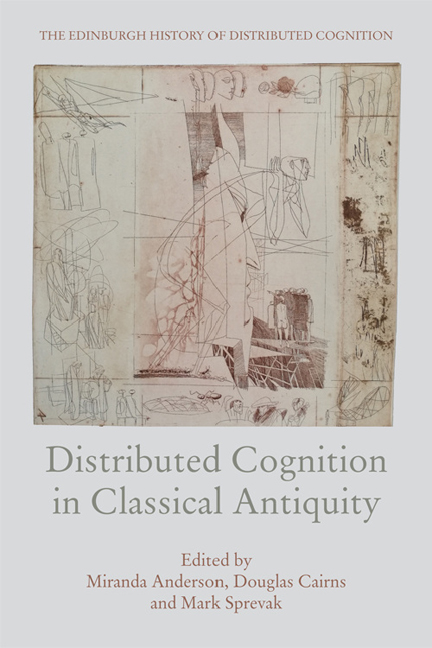Book contents
- Frontmatter
- Contents
- List of Illustrations
- Series Preface
- Miscellaneous Frontmatter
- 1 Distributed Cognition and the Humanities
- 2 Distributed Cognition and the Classics
- 3 Physical Sciences: Ptolemy's Extended Mind
- 4 Distributed Cognition and the Diffusion of Information Technologies in the Roman World
- 5 Mask as Mind Tool: A Methodology of Material Engagement
- 6 Embodied, Extended and Distributed Cognition in Roman Technical Practice
- 7 Roman-period Theatres as Distributed Cognitive Micro-ecologies
- 8 Cognition, Emotions and the Feeling Body in the Hippocratic Corpus
- 9 Enactivism and Embodied Cognition in Stoicism and Plato's Timaeus
- 10 Enargeia, Enactivism and the Ancient Readerly Imagination
- 11 Group Minds in Classical Athens? Chorus and Dēmos as Case Studies of Collective Cognition
- 12 One Soul in Two Bodies: Distributed Cognition and Ancient Greek Friendship
- 13 Distributed Cognition and its Discontents: A Dialogue across History and Artistic Genre
- Notes on Contributors
- Bibliography
- Index
10 - Enargeia, Enactivism and the Ancient Readerly Imagination
Published online by Cambridge University Press: 12 November 2019
- Frontmatter
- Contents
- List of Illustrations
- Series Preface
- Miscellaneous Frontmatter
- 1 Distributed Cognition and the Humanities
- 2 Distributed Cognition and the Classics
- 3 Physical Sciences: Ptolemy's Extended Mind
- 4 Distributed Cognition and the Diffusion of Information Technologies in the Roman World
- 5 Mask as Mind Tool: A Methodology of Material Engagement
- 6 Embodied, Extended and Distributed Cognition in Roman Technical Practice
- 7 Roman-period Theatres as Distributed Cognitive Micro-ecologies
- 8 Cognition, Emotions and the Feeling Body in the Hippocratic Corpus
- 9 Enactivism and Embodied Cognition in Stoicism and Plato's Timaeus
- 10 Enargeia, Enactivism and the Ancient Readerly Imagination
- 11 Group Minds in Classical Athens? Chorus and Dēmos as Case Studies of Collective Cognition
- 12 One Soul in Two Bodies: Distributed Cognition and Ancient Greek Friendship
- 13 Distributed Cognition and its Discontents: A Dialogue across History and Artistic Genre
- Notes on Contributors
- Bibliography
- Index
Summary
Introduction
In recent years reader-response theorists have begun to explore the potential of the ‘second-generation’ enactivist theory of cognition for the analysis of readers’ quasi-visual responses to literature. While these studies bring to bear a range of perspectives on the phenomenon by which readers may at times feel that they can vividly and directly perceive the storyworld, they converge on a view of vision and imagination, not as driven by mental images ‘seen’ with the mind's eye (the positing of internal representations being a central tenet of ‘first-generation’ cognitive studies), but as enactive, that is, a way of acting. As I shall explain in greater detail below, enactivism posits that (quasi-)visual experience is not all ‘in the head’, but emerges through interactions with the world around us. What I wish to contend in this chapter is that there are salient and non-trivial points of resemblance between these enactivist views of the readerly imagination and the ancient rhetorical concept of enargeia (usually translated as ‘vividness’). This term, which on a minimal ancient definition is said to be ‘speech which brings the subject-matter before the eyes’, figures prominently in ancient criticism and rhetoric and is used in particular to characterise the vivid, quasi-visual effects which epic poetry, historiography, oratory and occasionally other kinds of literature may have on readers.
Now, at first sight this contention must appear implausible. For, whilst acknowledging that enargeia is a multifaceted concept, recent classical scholarship holds that the term primarily refers to ‘pictorial vividness’, as brought about through the transference of picture-like internal representations from author to reader by means of detailed descriptions (ekphrasis), and this account ostensibly matches the references to concepts like ‘mental images’ and ‘the mind's eye’ found in ancient comments. Thus, a scholiast (Σ bT Il. 23.362–72) praises the first lines of the description of the horse race for Patroclus’ funeral games in the Iliad by stating that Homer ‘has projected the entire mental image (phantasia) so vividly (enargōs) that the readers are no less captivated than the spectators (theatōn)’ (πᾶσανφαντασίαν ἐναργῶς προβέβληται ὡς μηδὲν ἧττον τῶν θεατῶν ἐσχηκέναι τοὺςἀκροατάς).
- Type
- Chapter
- Information
- Distributed Cognition in Classical Antiquity , pp. 173 - 193Publisher: Edinburgh University PressPrint publication year: 2017



